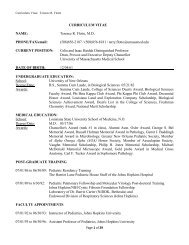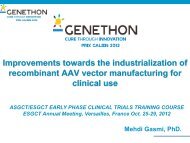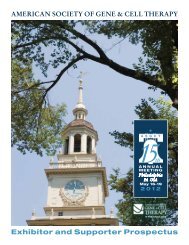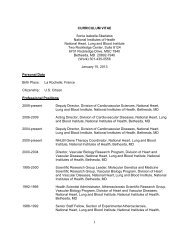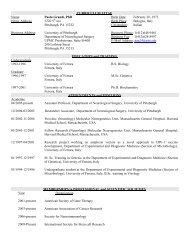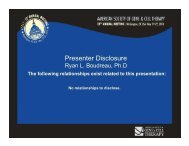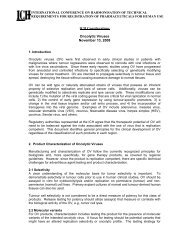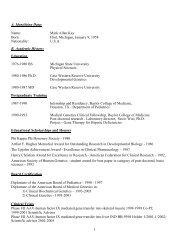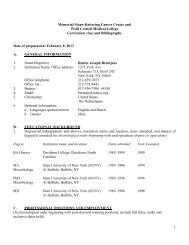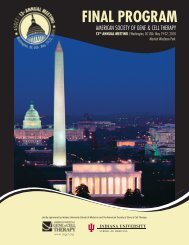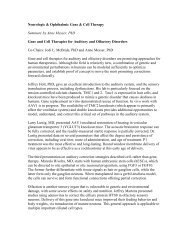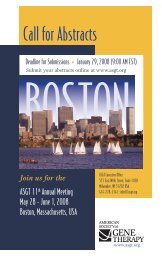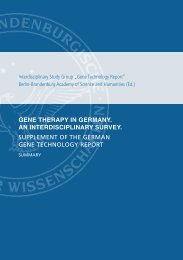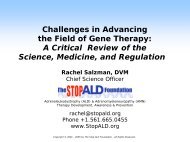Final Program - American Society of Gene & Cell Therapy
Final Program - American Society of Gene & Cell Therapy
Final Program - American Society of Gene & Cell Therapy
You also want an ePaper? Increase the reach of your titles
YUMPU automatically turns print PDFs into web optimized ePapers that Google loves.
<strong>Program</strong> Schedule, Saturday, May 18, 2013<br />
Michael A. Lalamme, MD, PhD<br />
Cardiac Repair with Human Pluripotent Stem <strong>Cell</strong>s<br />
Human pluripotent stem cells have a number <strong>of</strong> potential advantages for use in myocardial infarct repair, including tremendous<br />
capacity for expansion in the undifferentiated state and unambiguous cardiac potential. Our group irst reported what are now<br />
widely applied methods to eficiently guide the differentiation <strong>of</strong> human embryonic stem cells (hESCs) and induced pluripotent<br />
stem cells (hiPSCs) into cardiomyocytes, as well as their further differentiation to speciic cardiac subtypes (e.g. pacemaker or<br />
ventricular myocytes). In early pro<strong>of</strong>-<strong>of</strong>-concept studies using a rat infarct model, we showed that the transplantation <strong>of</strong> hESCderived<br />
cardiomyocytes results in partial remuscularization <strong>of</strong> the infarct scar and improved contractile function. More recently,<br />
we have used a guinea pig infarct model to show that hESC-derived cardiomyocyte grafts can integrate electrically and contract<br />
synchronously with host muscle; and that these grafts exert an intriguing arrhythmia-suppressive effect. Our ongoing efforts are<br />
focused on promoting the structural and functional maturation <strong>of</strong> hESC-derived cardiomyocytes, as well as their electromechanical<br />
integration in vivo.<br />
Ann M. Leen, PhD<br />
T cell <strong>Therapy</strong> for Viruses and Cancer<br />
Severe and fatal viral infections remain common after hematopoietic stem cell transplantation. Adoptive transfer <strong>of</strong> in vitro<br />
expanded cytotoxic T lymphocytes speciic for EBV, CMV and Adv antigens can treat infections that are impervious to conventional<br />
therapies. However, the time taken to prepare patient-speciic products, the limited breadth <strong>of</strong> viral speciicities that can be<br />
accommodated in a single line, and the lack <strong>of</strong> virus-speciic T-cells in cord blood and seronegative donors restricts application. In<br />
this presentation I will summarize our preclinical efforts to address these limitations and will present our clinical trial results using<br />
these products.<br />
Oral Abstract Session 410<br />
10:15 am - 12:15 pm<br />
ROOM: 150 DEFG<br />
Late Breaking Abstracts<br />
CO-CHAIRS: TO BE DETERMINED<br />
(Abstracts 725 through 732; see page 124)<br />
Saturday, May 18, 2013<br />
Oral Abstract Session 411<br />
10:15 am - 12:15 pm<br />
ROOM: 150 ABC<br />
Adenovirus and Other DNA Virus Vectors<br />
CO-CHAIRS: Prem Seth, PhD and Miguel Sena-Esteves, PhD<br />
(Abstracts 477 through 484; see pages 124-125)<br />
70<br />
<strong>Final</strong> <strong>Program</strong> SALT LAKE CITY, UTAH May 15–18, 2013



